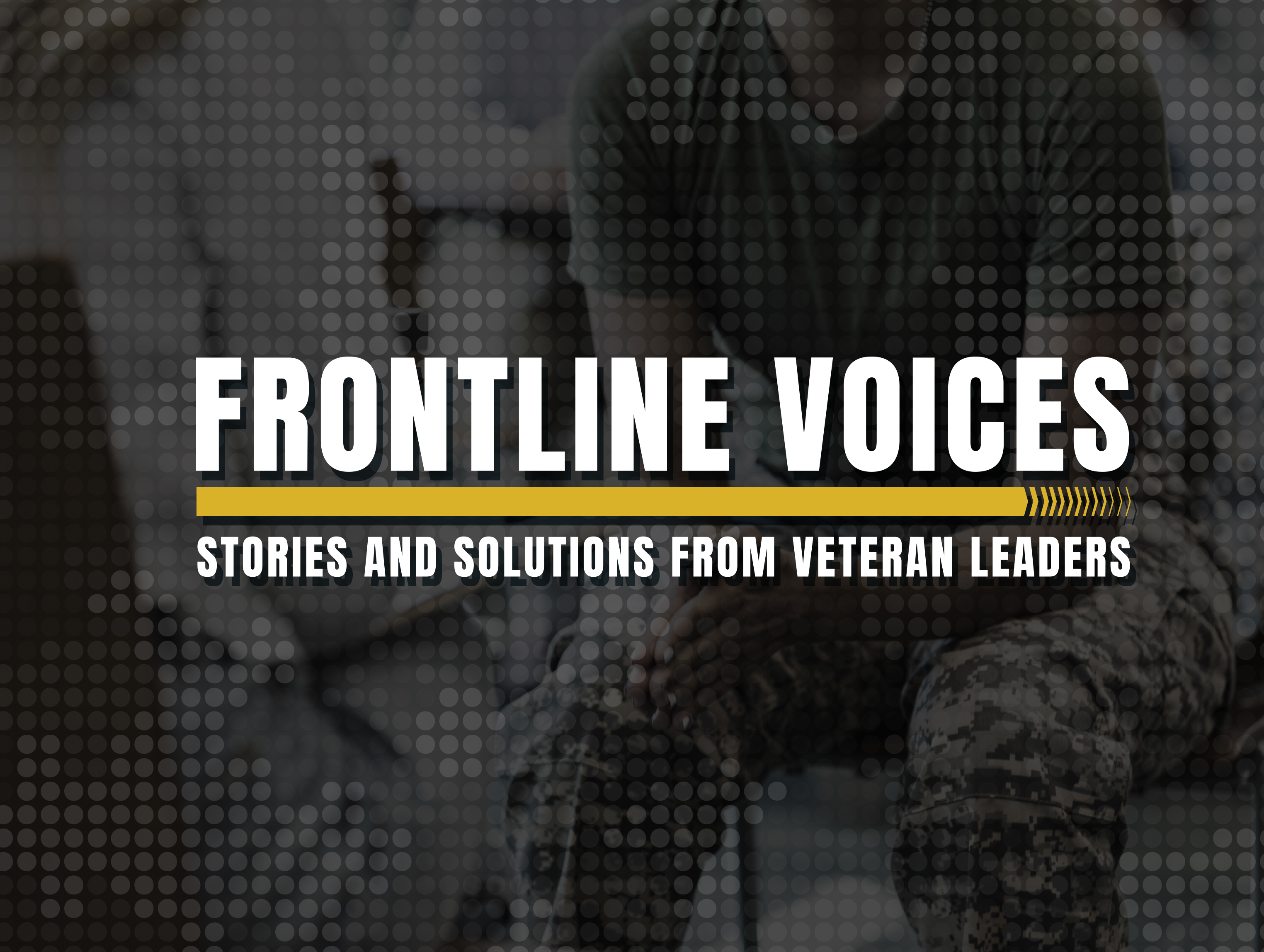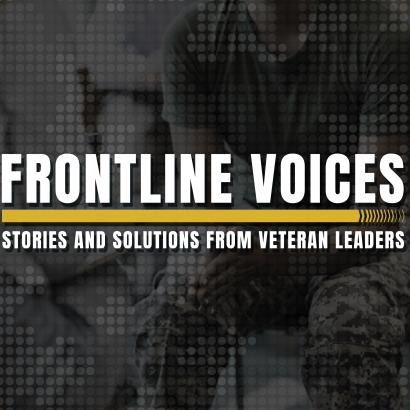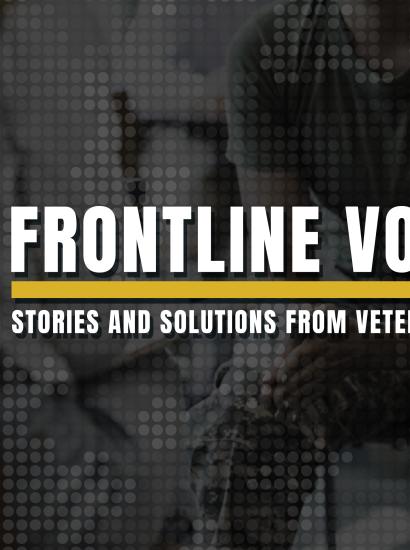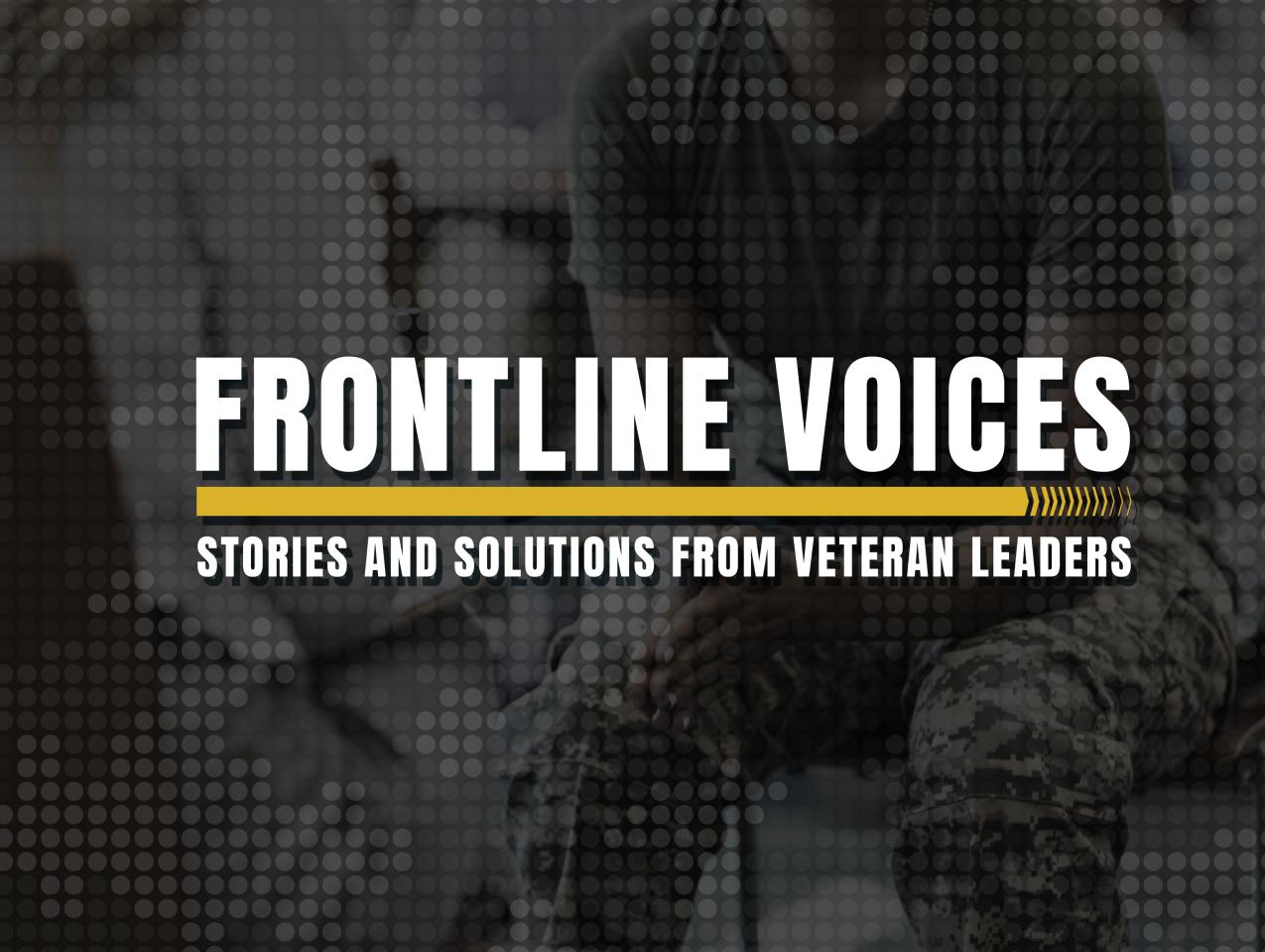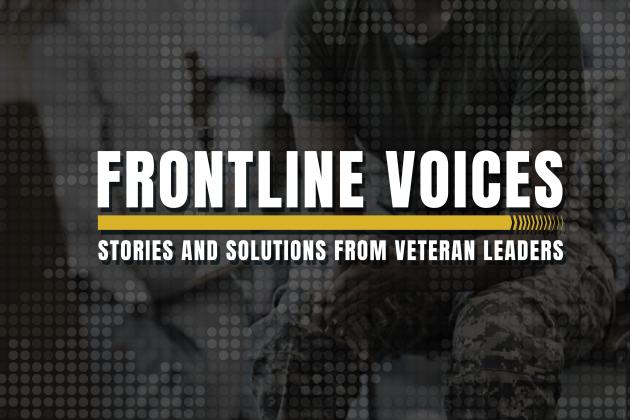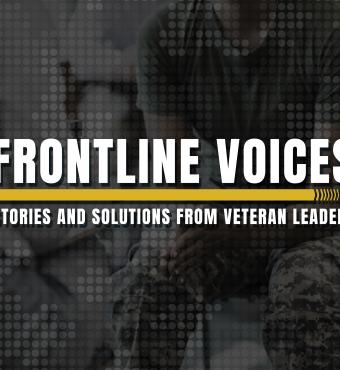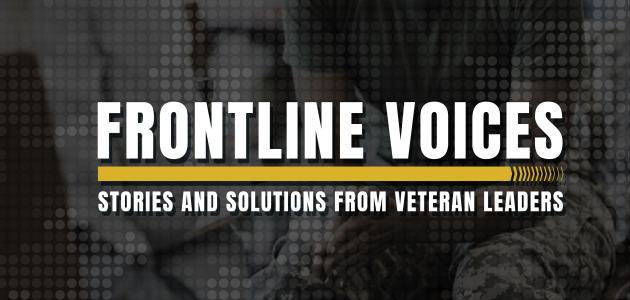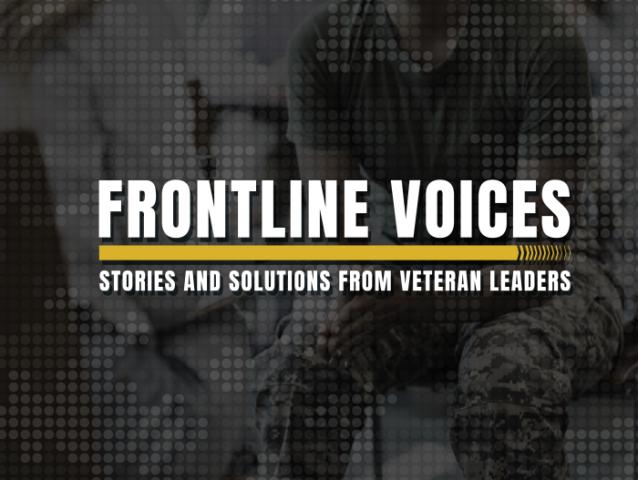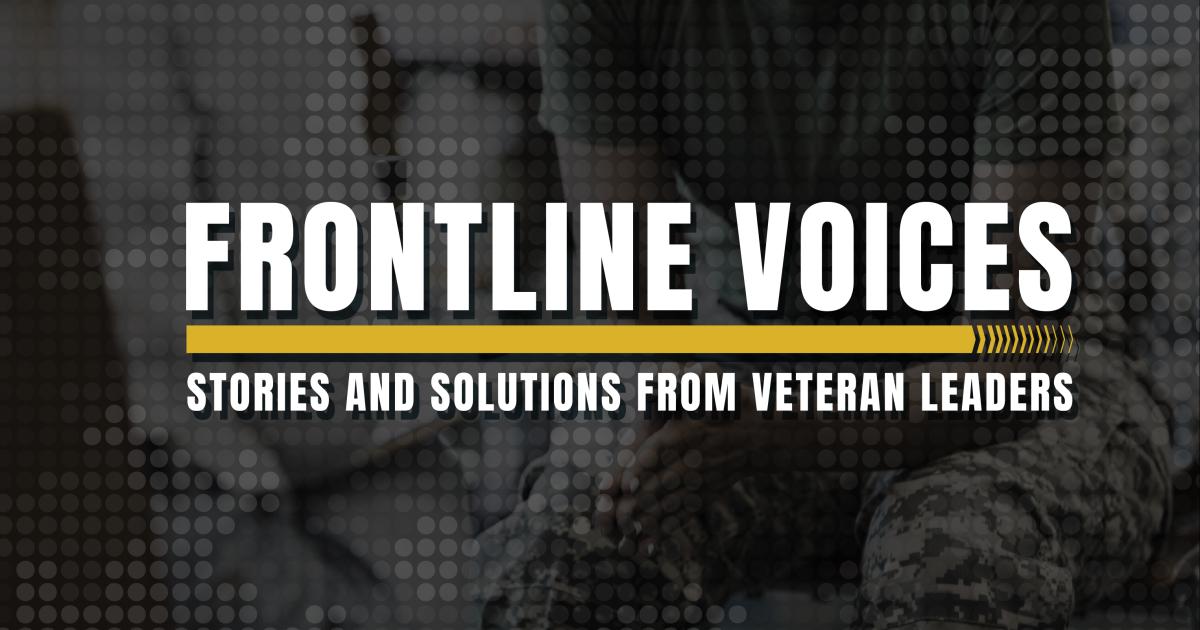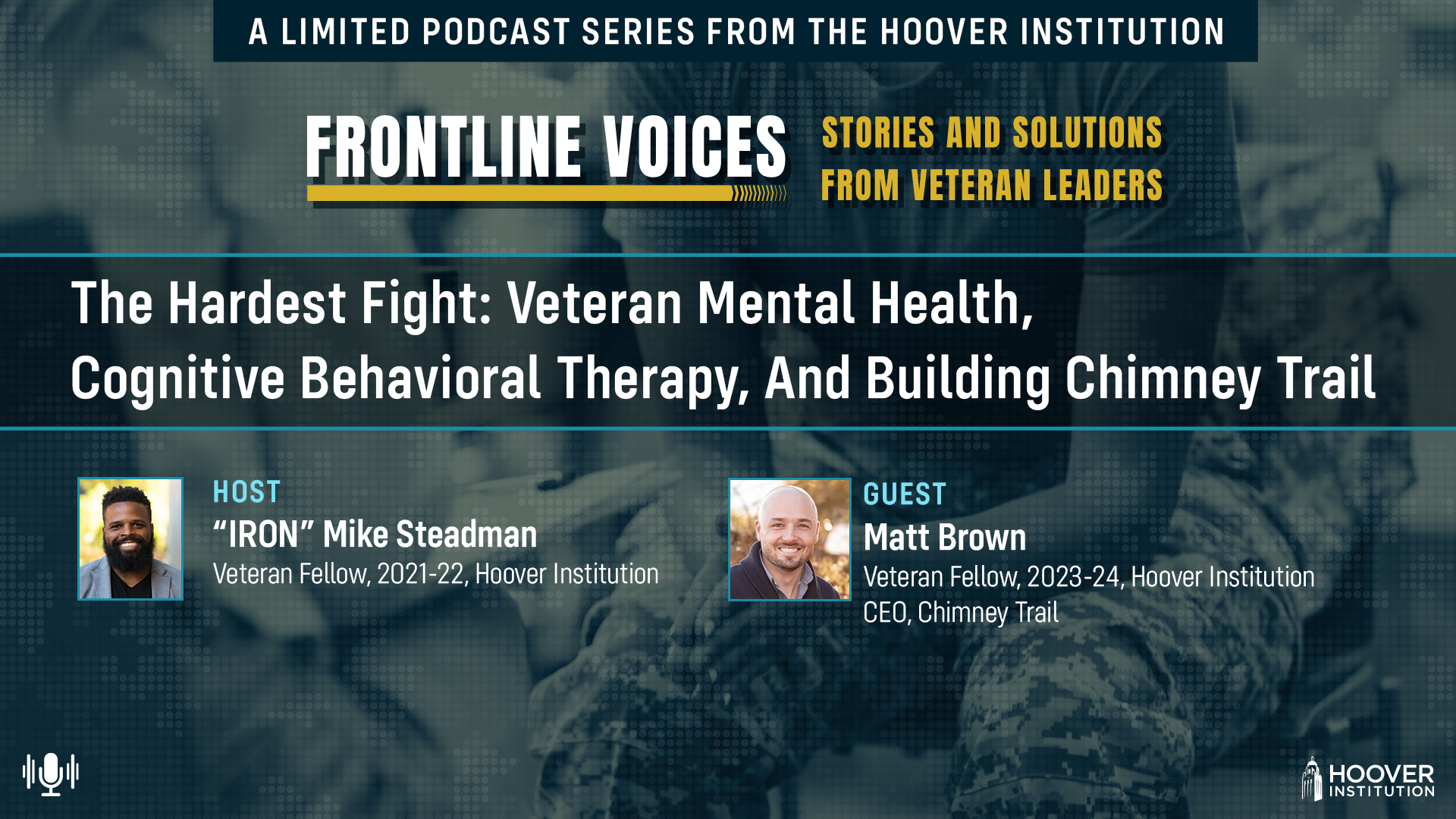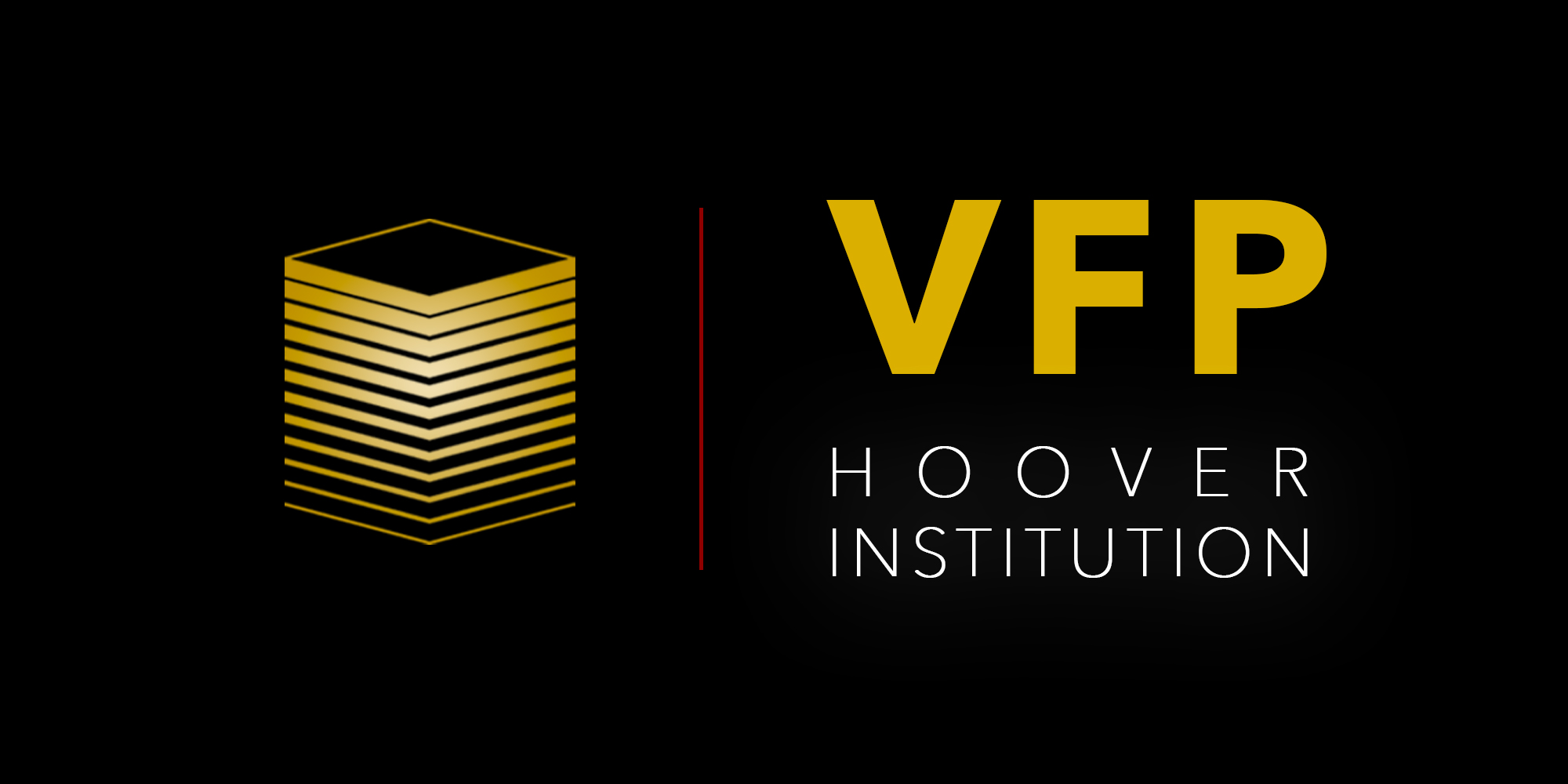In this powerful and personal episode of Frontline Voices, IRON Mike Steadman sits down with Matthew Brown, Navy veteran and founder of Chimney Trail Health, to talk about the often invisible battle veterans and high performers face: mental health. They unpack the power of Cognitive Behavioral Therapy (CBT), the hidden costs of unresolved trauma, and the real-world impact of suicide in their communities. Mike shares a vulnerable story about personal loss and how it pushed him to seek help. Together, they discuss how to reframe thoughts, find sparring partners for the mind, and train like your life depends on it, because sometimes it does. Whether you’re a veteran, an entrepreneur, or someone struggling silently, this episode is a lifeline.
Recorded on April 8, 2025.
WATCH THE VIDEO
>> 'Iron' Mike Steadman: Welcome to Frontline Voices, a podcast brought to you by Stanford University's Hoover Institution, exploring leadership, service, and solutions to some of our nation's most pressing issues. I'm your host, 'Iron' Mike Steadman, a Marine Corps veteran and member of the Inaugural Class of Hoover Veteran Fellows. In the aftermath of the COVID19 pandemic, a never ending 24.7news cycle, and the rise of social media, one topic that I'm excited to address is mental health.
Regardless of one's age, background, and socioeconomic status, maintaining one's mental health is a constant battle. To join me in this discussion, I brought on former Hoover Veteran Fellow and Naval officer, Matt Brown, CEO of Chimney Trail Health, a behavioral healthcare company specializing in preventative adaptations of cognitive behavioral therapy, commonly referred to as CBT.
For those of you unfamiliar, CBT is a form of psychotherapy that focuses on the relationship between thoughts, feelings, and behaviors. Having overcome my own challenges with mental health and witnessed its devastating effect in the veteran community and beyond, I knew Matt would be a good sparring partner to have this conversation with.
I do need to give you a heads up and warn you that at times we get a bit heavy and vulnerable. To be honest, I even shed a few tears. But I hope this discussion helps move the conversation forward about how to address mental health in our own lives and for others.
As always, I hope you enjoyed today's show and look forward to hearing your feedback. Matt, my brother, thank you for coming on Frontline Voices. How you doing, sir?
>> Matt Brown: I couldn't be better. Always fun to come on Iron Mike show, no matter which one it is.
>> 'Iron' Mike Steadman: Yeah, we've had quite a different podcasts over the years, but this one is a little bit close to heart.
Anytime you see me personally hosting a show, it means it's a subject that I'm really passionate about and particularly stuff that creates like an impact in the veteran space. So, no, everything that we've been able to do over the last few years with the veteran Fellowship program, you know, reaching change makers, and then now with this platform, complimenting that by bringing on voices such as yourself.
And I think today's conversation is going to be really good because, you know, we're trying to get out of the classroom a little bit with this show and talk about kind of issues that are affected by policy, but kind of bringing that human component to it. And unless you've been living under a rock like the last five years, mental health is like, it's.
It's a real thing. I think when I was first going to the Naval Academy, right. You have this perception, and I'm gonna ask you about this as we talk about the challenges with mental health and being a veteran and stuff, etc. And it was hard for me to really see when I was younger, but now that you're starting to get older, you start losing classmates and friends.
And then as entrepreneurs, you every day is a battle. All it takes is to wake up one day and say, I don't want to compete anymore. So I'm really excited to the insights that you're going to bring. So I know I talked a little bit, but let's go ahead and just kind of have you introduce yourself to everyone and what you're doing with Chimney Trail Health.
>> Matt Brown: You got it. Hey, Iron Mike, thanks for having me on the show. Grateful as always. I'm Matt Brown. I'm the founder and CEO of Chimney Trail Health, and what we do is we create preventive adaptations of something called cognitive behavior theory. So you go to a psychologist, and they'll give you something called cognitive behavioral therapy.
And there's a ton of value in that. And we wanted to essentially take that magic that's happening inside the office and. And present it in a more egalitarian way so that everybody can do it, whether or not they think that therapy is right for them. It's a really good way of sort of fine tuning your own mental processes.
>> 'Iron' Mike Steadman: Can you define CBT a little bit more for our audience that isn't familiar with it? I know, for one, like, I wasn't as familiar with it, but, outside of the podcast, I'm a professional business coach, and so I'm always diving into literature and stuff like that. And I recently came across a book called Socrates about Socrates and him talking about.
They equated, like, his kind of philosophy with cbt, and that got me thinking about you.
>> Matt Brown: So you got it. Yeah. So CBT, when you hear the word CBT, what people are talking about is cognitive behavioral therapy, and that is you actually go talk to a trained clinician, and they step you through the principles of CVT, which is essentially that we have a couple of different modes of thinking, and sometime our faster mode of thinking leads to what they call cognitive distortions.
And cognitive distortions exist because human beings are not inherently rational. We always thought that we were inherently rational, but it turns out that we think in terms of things called prospect theory. And so cognitive distortions come up, and it's just unclear ways of thinking about things that exist or might not exist.
And the good news for us is that there, there might be an infinite number of these cognitive distortions out there, but for most human beings there are 10. And so if you learn about these cognitive distortions through working with a trained clinician in like cognitive behavioral therapy, or you work with us on our program, we teach you about those distortions and then you can overcome them.
And what it ends up doing is it ends up like if you're having really bad anxiety or depression, you're in this ruminative thought pattern. If you learn these theories, it can arrest that thought pattern and put you on a much healthier path.
>> 'Iron' Mike Steadman: So, I want you to put your thought leader hat on for me now because like 10 years ago I never even heard CBT.
Then the first time I started hearing about it was connecting with you. And now I'm hearing it a lot more like, what changed? Why is this so prevalent now?
>> Matt Brown: I think it's prevalent now because there's this huge wave of interest in stopping the stigma when it comes to talking about mental health related concerns.
I also think that frankly, we've been sort of glued to social media and that has exacerbated some of our behavioral health related concerns. You might know Jonathan Haidt, Dr. Height from New York University, and his great book the Anxious Generation. This is leading people to have, okay, I've got kids that are tremendously anxious or they're suffering some sort of clinical level of depression.
What are we going to do about it? And CBT as founded by Dr. Aaron T Beck out of the University of Pennsylvania, it's been around for 40, 50 years, it's been around forever. And it's one of those things that I love. You're talking about operationalizing concepts, this CBT is one of those things that can be put to work, it doesn't need to live in an Ivory Tower.
You can roll it out 50 years of, of evidence based data and it's, and if you practice it, you can get good at it. It's just not that hard.
>> 'Iron' Mike Steadman: When I was, I'm gonna take off my armor here and get a little bit vulnerable. So in 2023, it was the summer 23 and I was on a podcast like this, except it was going live for an organization, got bunker called Bunker Labs.
And I got a call from my best friend and he said, pick up the phone, I need to talk to you. And I couldn't talk to him cause I was live on the podcast. And then I found out that one of our friends had committed suicide. He shot himself in the ass.
And I found out right then and there on the podcast and I had to break. I mean, I just couldn't do it. I had to hop off. I was like, I'm sorry, and stuff, etc. And that put me in a very sad place because for us as entrepreneurs, you know, we always do this kind of stuff, thinking that there's this long term outreach.
Outcome, that's what we're grinding towards, that we're working towards. But we had never imagined that what if this is all we have, you know, like in the grind? Because make no mistake, Matt and I are still in the grind of building. You agree, but you start losing people, especially so tragically like that it created like a existential crisis where I start to kind of just really look internally, am I fulfilled?
Am I all these different things? And I realized that, I was very depressed because that happened and I had to tell my team that I was depressed. I told my partner Simone that I was depressed as well. And I went ahead and hired an entrepreneurial mental health coach and immediately started working with her.
And then during that time I start to. I'd always kind of invested in the self help stuff, but really leaning into kind of reading and journaling and really prioritizing kind of woo woo self care, but it matters, even if it's just getting a haircut and a hot shave towel and I have self care Thursday that I do.
But it just brought that kind of front to front to mind for me. And so much of what I've done is particularly in this space of like veteran entrepreneurship. I've been trying to kind of redefine or show other sides of veterans that's not like, hey, we're all broken, we need help, the mental health and stuff, et cetera.
>> Matt Brown: Yeah.
>> 'Iron' Mike Steadman: But man, as I'm getting older, I'm seeing more and more people breaking down.
>> Matt Brown: So yes to everything that you just said. And first of all, thanks for being vulnerable in that way. I think it's important that we feel free to talk about that stuff when we do at Chimney Trail Health, when we do our seminars and we're teaching people about prospect theory and cognitive behavior theory, a huge chunk of it is actually soliciting stories from the people that are in the cohort or the crowd that, that we're presenting this material to.
And what you discover very quickly is that you are anything but alone. That in every crowd there's two or three other people that have that very same story. And on this podcast, there's only two of us. And I have that story. The whole company Chimney Trail Health was founded because I was a captain of one of our Navy ships.
I rotated to be a part of Seal Team 17 for a while and I was in that job for about a year. And I got a phone call from the new captain of my old ship and he Said our best young officer, a guy that we thought was going to be the chief of Naval operations one day, had gone to Marine Corps Exchange and he bought a gun and he took his own life and sat with his folks in a hospital as he was passing away.
And it alters the trajectory of your life. But what I think I've learned from this is that you can approach it like one of two ways. You can live in that and then not do anything about it, or you can do exactly like you did, which was start taking action.
You can find somebody to help get you through it. I did the same. And it sorta led to this journey, which is introducing CBT concepts to people before they need it in a preventive context. And I think the more people learn about it, the better off we'll be.
>> 'Iron' Mike Steadman: So when we're younger, right, at the Naval Academy, I was three time national boxing champ, two time most bio boxer captain, my boxing team Marine infantry officer. You felt like nothing could break you, right? And you went through your different challenges. But I don't feel like a lot of those challenges when we were younger were that kind of existential type of challenges maybe for some people.
And I went through a lot at the Naval Academy my sophomore year, my mom had a stroke dealing with that. Coming out of a single parent home, being in a tough environment like that, going to Afghanistan, fighting a good fight as an infantry officer, but telling you, I don't know what it is, but like, and just being.
Maybe it's entrepreneurship, maybe it's just we're getting older or what it is, but the battle against mental health is a lot different at this older age than I feel like it was when we were younger.
>> Matt Brown: So I'm gonna agree with you, but then I'm gonna put a caveat on that.
So first of all, I know it feels different, right? But when you're younger, you're just all ahead, flank, no matter what it is. And it's almost like, you know, you just got so much in front of you that you don't have time to reflect. In the psychiatric community, they call what, as you age, you start to do this thing called surveying, that.
That's the word that they use for it, surveying. And it's the process of reflecting on the years that have gone by. And it's this process of trying to figure out whether or not the values that you have are actually consistent with what you're living. And the, and the bigger that delta, the more trouble that you have.
The problem is a lot of times we are really bad at figuring out what that delta actually is. Your values might be here, and here's where you're living. But for some reason, in. Because of we're predictably irrational, you might end up feeling like you're over here, and that leads to anxiety and depression, all that kind of stuff.
And I think the big difference is that you have to be more measured as an adult in the way that you approach problems. Let me ask you, how did you learn to box?
>> 'Iron' Mike Steadman: Man. In the ring.
>> Matt Brown: It was a process. Yeah. Yeah. In the ring. Tell me, walk me through it.
Like, tell me how. Tell me how you learn.
>> 'Iron' Mike Steadman: Yeah. So, obviously at the Naval Academy, right, you show up to the gym, you practice, you don't know how to. You don't even know how to protect yourself. Coach teaches you a couple punches. Now, you spend the majority of your time shadow boxing, right?
Then you start moving to the heavy bag. You train on the heavy bag. You do your jump ropes, you do all the kind of basic training and then your kind of physical training. But we would spar consistently. Every Tuesday and Thursday, you would spar. And at first it was hard because, you feel like you're making all this progress on your shadowboxing, you're making all this progress on the heavy bag, and then you get in the ring and none of it's translated.
>> Matt Brown: Doesn't work.
>> 'Iron' Mike Steadman: Doesn't work. And one day I realized that this was happening, and there was another boxer. His name was Chris O'Brien. And me and him were like, he had this thick Boston accent. One day he walked in, he was like, hey, yo, Mike, you want to spar?
I was like, sure, let's go. We start sparring, and we start sparring every day. Hey, Mike, you want to spar? We sparred for 30 days straight. Probably not the best to recommend, but what it did was it got me comfortable. Being in the ring. That was a big part of that.
And I realized that, like, I needed to prioritize that, like, sports specific training of sparring, because sparring is where everything translates. You can be the best at hitting the heavy bag, you can be the best at doing the shadow box and looking good on mitts. But until you're under that pressure and you find yourself in the ringer, that's when it becomes real.
>> Matt Brown: That's it, man. Everything. It's all good until somebody gets punched in the face. And it's the same thing with behavioral healthcare and training on how to forge elite mindsets. Imagine if you went to that boxing ring on your first day, and you were like, hey, I want.
Hey, coach, I want to learn how to box. And they were like, hey, here's an app. You'd be like, what am I gonna do with this app? I can't. And that's exactly what's happening in the space, is that there's an app for that for pretty much everything in life.
But the problem is that you have to put in the work, and you have to do it. So what we're doing at work every day is working with our Chief Clinical Officer, Dr. Leah Blaine, and trying to figure out how do we create that sparring experience for people?
How do we make it so that you're sparring against the part of your brain that's feeding you information that's just not so? And what we've uncovered is that you gotta learn about cognitive behavior theory. You have to learn about prospect theory, but just knowing about it is not gonna get you the outcomes you need.
You have to get in the ring. And so what we've done is we mail you these boxes, and inside each box, there's a little activity. And it's got fun little. It's a high quality stuff. It's, high quality tools for outdoor activities. But you do the activity and you read about the material and the, the combination of doing that is your mental equivalent of being in that ring.
And that's where we're seeing the outcomes, is people doing the work. And that's the secret Elixir.
>> 'Iron' Mike Steadman: So let me ask you this though, and this is something that I've come to. To think about, pontificate on what a lot of people don't know. Well, they, Some do because I talked about my podcast was one of the when I was at the Naval Academy, like I said, dealing with my mom having that stroke issue, right?
I lost my first boxing match in front of my entire class, Plebe Summer which was our intramural boxing tournament at the Cat Naval Academy in 30 seconds. Completely embarrassed, right? So I had that happen. And then when I went to Afghanistan, you spend all this time going to the academy, training to be an infantry officer, you're fighting a good fight in combat.
The last month of our deployment, I got relieved of command in combat for a bad operation that I led. And that was another very dark place. But so much of that happened early on in my life that I feel like I was able to build up some kind of mental resilience that I appreciate later because.
Because when I am going through hard times, I have these other areas of life, these little dark places that I've been able to bounce back from. And when you deal with people, let's call them high performers or whatever you want to call it, right, that may or may not have had that big significant miles, that big significant, like gut check early on in life, and they start dealing with it a little bit later, they don't have.
I could only imagine going through some of the stuff I went through early at this age and having a prostate at this moment in time and not have that to fall back on.
>> Matt Brown: I think you're right. I mean, you hear some people say the obstacle is the way.
And if you can get through it early and you sort of mature into this idea that it's not the critic who counts. Like we were talking earlier about, like making sure that you're living consistent with your values. Okay, you had a mishap in combat or you had a bad decision that you wish you could have done differently, but at this age, hopefully in your surveying process, you're seeing, okay, the values gap was actually really tight.
Because in order to be in that position, to have to make that decision, good or bad, to begin with, you had to do all these other things, right, in order to be entrusted with that responsibility. And you know damn good and well that if presented the same situation in the future, you would not make that same mistake.
It served to, like, sharpen the sword, so to speak, and make you a better officer and a more complete citizen moving forward. And you won't be the first person who's made a mistake in combat. It's the most dynamic environment that, you know, outside of maybe space exploration, that a human being can exist in, and you certainly won't be the last.
And if you can piece that together, then I think you see, yeah, my integrity is intact. And that's really important to preserving your own behavioral health.
>> 'Iron' Mike Steadman: And when people always ask me now, they say, what would you tell your younger self? I go back, say, forgiveness, because when you're younger, you think you can conquer the whole world.
You can do all these different things. But then you take a step back and you realize, man, nobody had Afghanistan filled out. That was a very hard dynamic. They pump us up as Marine officers, right? Very proud of my service. But I do have to kinda give myself grace and recognize, like, hey, that was a very hard, kinetic, kinda chaotic environment.
And you and I both know that, like, what's the saying that, like, safety is an illusion, that the world has always been chaotic. We just create systems and things to make it feel more safe for us so we don't have to deal with the reality of all this chaos at times.
>> Matt Brown: That's it. And, you know, I'm not a trained psychologist. I'm not a licensed clinical social worker. I'm just a ship captain that was trying to make a difference in the space and is working. The good news is that I get to work with the best that there is.
And if Dr. Blaine was on with us today, she would take that example that you gave, and she'd say, hey, at the time, you were wrestling with a cognitive distortion that we see all the time in CBT called personalisation and self blame. And so that circumstance, whatever it may have been, you can own a piece of it.
Certainly you need to have accountability for your part in whatever it is. But the circumstances that led to that and the results that extend beyond it, you have to figure out how to dial in what, what is Mike's deal and what was the circumstances. And it takes practice to figure out how to do that forgiveness exercise.
And I'm glad you did it. That's an example to all of us.
>> 'Iron' Mike Steadman: And back then I didn't really know how to journal, right. I just had this rule that I developed in boxing which was, hey, when I decide I want to be the best boxer, I locked in, no alcohol, do your workouts, really just kind of focus on that.
So when I got back from Afghanistan, that's exactly what I did. No alcohol, locked in, went to the gym and was focused and was able to get myself out of that space. But now, and I think these are things everyday Americans are facing with because I see it especially in communities like Newark and Harlem.
And then you visit SF, you visit some of these other places. A lot of people out here are self-medicating.
>> Matt Brown: Yeah.
>> 'Iron' Mike Steadman: Alcohol, drugs, cannabis, right, and it's real easy to think that these are other people, but these are people within our existing community. People that look successful on paper and they are, right.
But a lot of people are dealing with like very kind of challenging, dramatic stuff, and they're finding other ways to cope instead of. Because I think even what we're talking about with like the CBT approach, right. It still takes work. But people even in an environment that cultivates that kind of growth, you're right on the money.
>> Matt Brown: And in CBT, they talk a lot about, you might have an automatic thought process because the human being, the human brain is, is wired. It's not wired for your happiness, it's wired for your survival. And so you might be going along having these automatic thoughts that your brain thinks are key to your survival.
And CBT teaches you to check on those thoughts because they might not be true. You have to evaluate them for rationality. The example we always use is a bat and a ball together cost A$10. The bat is a dollar more than the ball. How much does the ball cost?
Everybody thinks it's 10 cents, it's actually 5. But our brain operates in these automatic states. What we don't often talk about when when either in therapy or in seminars or wherever is that sometimes it's not the conscious thought process that we really need to evaluate, it's our behavior.
So you might decide, I'm not touching alcohol because I've been going through a dark place and I know that that's self medicating. I know it's bad for me, but you find yourself sort of automatically doing it anyway or just like letting your guard down and just self medicating.
And what Dr. Blaine would tell you if she was here is she'd say that is the thing that you need to catch. It's like, hey, I'm catching that behavior. And then in CBT, they talk about catching and then checking the rationality of it and then changing your mind if it makes sense to do so.
So if you end up drinking or self medicating or whatever, that's something that the awake part of your brain can catch and then you can check on it and change.
>> 'Iron' Mike Steadman: And well, I'm surprised, this might be a little offensive to some people though, right? But as you get older, you start to learn these things, man.
There's alcohol all around the military, all around the military, and nothing against people that drink, right? That's not what I'm saying. I'm just saying that you have this demographic that is dealing with some very kinda challenging kinda lifestyle and stuff, etc. And their whole way of decompressing is to go get hammered, on the weekends or whatever, and then now they leave that environment, they're going back to sports.
Civilian world. And what are they doing? Going back to those old habits, right? And so just, you just get, I'm being honest here, y'all. As I get older, I just start to look at things a little bit different and start to ask some kinda more, kinda challenging questions.
>> Matt Brown: Yeah, I mean, a perfect example of this is what, so Chimney Trail Health is the company, but then we have a foundation that Claudia Flores, another VFPer, she runs. And her mission in life right now is to go around to American Legion, VFW, DAV, those sorts of veteran service organization outposts.
And she's trying to bring in money to renovate those places. Because if you walk in them right now, it's a bar or a bingo hall or something like that. And so you're not thinking about sort of the environment that we enjoyed going through a program like Bunker Labs, which was inspiring veterans to have this entrepreneurial mindset and give back in the community and start serving in a different way.
You definitely aren't getting what folks are getting if they participate in the VFP program at the Hoover Institution, which is also inspiring that sort of give back mentality. You go into an American Legion in my hometown, it's a bingo hall with a bar with cheap beer. And it's a recipe for behavior that you wish you weren't participating in, but you find yourself there anyway.
And it's funny that you mentioned that this is a cultural thing because I'll be out with friends that are in the service. And it doesn't even matter if they're in your peer group, they could be younger, older, and if somebody hands you a beer, there's this implicit expectation that you're gonna participate.
And I don't even really, I don't like drinking at all. And so my wife Jen, she always makes fun of me because she's like, you always take that beer if somebody offers it to you, even though I know that you don't enjoy it. And it's true, because it's hardwired into us.
So breaking that, it's a challenge and it takes, and when's the last time you did something alone? Never, so why would you expect that you should do this journey alone?
>> 'Iron' Mike Steadman: Yeah, And I host happy hours all across the country, right? Host them here in New York City.
I do drink non-alcoholic beer, but again, I'm just thinking again, as I'm getting older, just being a lot more aware, man, there's so many traps and so many landmines, right? And I'm not saying you have to be an entrepreneur to understand just how hard the world is at time.
I just think we're more intuned, right? Because those, we just feel it a lot more. You feel exposed, right? You lose that safety net. But man, every time I walk out my door, I'm like, look at all these landmines out here. I see people high smoking weed all day.
And in my experience that's been causing in my personal network, from a lot of boxers that I've dealt with over the years in Newark, I have seen marijuana cause schizophrenia.
>> Matt Brown: Yeah, yeah.
>> 'Iron' Mike Steadman: People just start, while I'm not a doctor, I'm not anything like that. I'm just talking off of my own kind of personal lived experience.
And so I'm just, I'm constantly trying to encourage vets. I'm constantly trying to encourage youth I've dealt with at Iron Balance to avoid those landmines.
>> Matt Brown: I think you're right on the money. I mean we do a lot about adjusting the way that we talk about mental illness, behavioral healthcare, the stop the stigma campaign.
And along with that, there's been this huge effort to sort of introduce alternative modalities for getting better. And so you hear about ketamines or whatever the psychedelic medication happens to be or pharmaceutical intervention. And in a controlled environment with the right people, those things can be really powerful.
Because we always talk about these ruminative thought patterns that lead to destructive anxiety and depression would be like a person walking on the surface of clay. If you keep walking over that same surface, you're going to dig a ditch. And sometimes having that psychedelic intervention or that pharmaceutical intervention, it can pull you up out of the ditch and put you back on flat ground.
And then you can do the work with something like CBT to reestablish positive thought patterns, or if not positive, at least neutral and thought patterns based in reality. But what happens is that folks don't do it in a controlled atmosphere. Instead they start that self medication process you're talking about and they end up doing more harm than good.
Instead of resetting and getting on an even keel, they just drop a nuclear bomb in the middle of their thought patterns and then it's hard to escape.
>> 'Iron' Mike Steadman: So, okay, this is good because it's a podcast, we're talking about this stuff. This is free speech. I'm not as informed as you, but I'm gonna share my view, and please tell me if I'm wrong or whatever, okay?
One of the things I worry about with so much kinda medicating, particularly people that are dealing with mental health issues, is in the Marine Corps, we say be brilliant in the basics. Can you shoot, move and communicate, right? In a civilian world, are you getting rest? Are you drinking water, right?
Are you getting some movement in? Are you breaking a sweat? Are you having nurturing relationships, right? Are you brilliant in prioritizing and amplifying those things first? And then if that's not working, right, maybe you're adding additional kinda stuff in, right? But that's not what I'm seeing in my personal experience, right?
I'm seeing people that are really having a hard time figuring stuff out and they're kinda trying and exploring a bunch of different stuff. And I worry that, hey man, let's prioritize the main thing. I have a whole coach. His name's Robert Hamilton Owen, shout out to Robert. And I'm training for New York City Marathon.
I also have a peak performance coach I work with named Melissa. And I'm always going, what's the one thing that if I nail funnels everything else? And for me it's getting in bed early and getting up early,. If I can do that, I'm not saying life isn't hard, but it's just I can face challenges a lot differently when I'm taking care of business on that front versus when I'm not getting rest, I'm not working out, I'm not hydrated, right?
It's really like going to war every day.
>> Matt Brown: Yeah, I mean, and I don't know that, so what you just described is basically all of us, I mean every single one. If you can get brilliant in the basics, then you're covered. I think the pharmaceutical medication side of this, you'll never hear me say a cross word about it.
What I will say is a cross word about doing or for self medicating, not having the right intervention at the right time. So if you wanna get brilliant in the basics, sometimes you need a pharmaceutical intervention to level set so that you can start reestablishing those patterns. Because you've dug a ditch that's too deep to climb out of yourself and you could use a hand.
But all of that stuff needs to be in a super controlled environment. And I think you would find that most psychiatrists would tell you, at least the ones that we work with, they would tell you that the idea is not to just be on these things indefinitely. It's not to be on a pharmaceutical intervention forever.
Some cases that might be necessary, but oftentimes it's not. What it really is is to sort of rescue you from that ditch and then give you the opportunity to start in on those habits that you're talking about, whether it's getting to bed on time, waking up on time, hydrating.
It's funny that you mentioned those things, because we've got a waypoint kit at Chimney Trail Health. It's the third one in our series of four that we send out to the Armed Forces. And the fourth one is setting a new habit. And it's exactly that. There's some resistance bands, there's an eye mask for sleep, there's a water bottle for hydration.
It's all these basics that you sorta just, if you go to war, it's the best kinda war because you can check in with yourself at the end of that day and be like, hey, did I do all those things? And if you didn't, you could, you don't need to beat yourself up.
You can say, okay, let's get at it again tomorrow. And get right back up on the horse.
>> 'Iron' Mike Steadman: Yeah. And again, like I said, I. I appreciate you making space to kind of have these discussions now, because sometimes it's like you can't even talk about this stuff because people have their own opinions.
But even when I did talk with my mental health coach about it, she is way more educated than, like, me, and she did kind of make the same argument that you did as well. I just, for me as a coach, I'm always trying to think about, like, man, how can we cover down on these things?
But again, as I get older, I'm less reactive and more reflective. And so being reflective, sometimes you do hear those different opinions and stuff. Now, I remember how I said at the beginning of this podcast how a lot of what I try to do in the veteran space is push a lot more kind of positivity.
>> Matt Brown: Yeah.
>> 'Iron' Mike Steadman: And I try to stay away from the heavy stuff. So this might be one of the heavier episodes. But, we talked early on about how suicide. Another thing I wanna run by you and hear your perspective on is, I love the word excellence, and particularly this concept of normalizing excellence.
It's like the first episode I had with Greg on, we talked about what that means. Whereas you see someone in a space, and then all of a sudden it normalizes it for you, that's possible. You know, seeing Matt Brown, a veteran fellow at Stanford, at the Hoover Institution, like, now I see that's possible for me.
Right. But what's the reverse of that? And for me, I think that in the veteran community in particular, is suicide. Because for me, I don't feel like I really. Growing up, maybe I was protected from it or whatnot, but I feel like being in the veteran space, going to a combat zone.
Like, you're constantly hearing about suicide amongst veterans, suicide amongst veterans, and all of a sudden this option that you didn't even know existed, now it's there. Does that make sense?
>> Matt Brown: Yeah, it does make sense.
>> 'Iron' Mike Steadman: And I worry about that, is what I'm getting at.
>> Matt Brown: Yeah.
You worry about the exposure to it becoming a risk factor all its own.
>> 'Iron' Mike Steadman: Correct.
>> Matt Brown: I worry about the same thing. I don't know that the numbers bear out in terms of, like, that being a legitimate risk factor, but it feels like it is. It feels like the more that you hear about it, the more it's become normalized, the more it.
But I think that we're living in a super dynamic time when it comes to how we ingest information, our media diet, the way that we communicate with one another, the isolation that people sort of self impose by staying recluse in their apartment and just surfing through TikTok and Instagram all night, self medicating.
There are all these other risk factors that I think are contributing far more than our awareness of it. I think that the other piece is. It feels like it might become more of an option, but it's that we're just seeing what already existed. Like we're seeing the results of sort of our behaviors for the last 25 years, found manifest in this moment of having to grapple with suicide, whether it's in a veteran or military community.
And frankly it's all the communities because, the most Recent Surgeon General, Dr. Murphy or Murthy, he said, look, of all the health challenges that we have as a society, Covid, Cardiac arrest, car accidents, you name the thing, isolation, mental illness the lack of preservation of our own behavioral healthcare is what he considered to be our greatest threat.
And so I don't know what to do about. It's got to be in front of our face. And then I think it's on all of us to make sure that it doesn't become a real option. Here's the thing, if you feel like it is scientifically, this isn't like my opinion or whoever, but if you feel like taking your own life is the, is the right option for you, because you know you best, every psychiatrist, psychologist, licensed clinical social worker, chaplain, whatever, in the whole country, whole world would tell you scientifically you are wrong about that.
>> 'Iron' Mike Steadman: Of course.
>> Matt Brown: And in fact we, we start that every one of our seminars. We start with, with that because people feel like they know themselves best. So of course if I'm feeling it, it must be true. And that just ain't so, yeah.
>> 'Iron' Mike Steadman: And the reason I like again, the reason I'm.
I'm talking about this cuz I've been thinking about writing about it. But how do you write about it in a way, like growing up, how many people did you know commit murder, right? Like in your personal network.
>> Matt Brown: Nobody in my personal network.
>> 'Iron' Mike Steadman: Nobody.
>> Matt Brown: Yes.
>> 'Iron' Mike Steadman: Now, imagine if you grow up and now it's ten people in your personal network that's committed murder, right?
>> Matt Brown: Yeah.
>> 'Iron' Mike Steadman: Then that's probably like, man, who are you hanging out with, okay? Growing up, I virtually knew nobody that committed suicide. Right? Now I have lost count yeah, and there's words a lot I worry about of like, yo, what is it about this environment, being military veteran and you can.
Try to blind yourself to that stuff as much as you can, but the older you get and the closer it affects you, losing close friends to these things, like to now where you're subconsciously always worried when you don't hear from somebody, like, hey buddy, yeah, just checking on you, making sure you're good, doing a buddy check.
I feel like I have to be or we have to be way more prevalent about that versus like.
>> Matt Brown: Before you're right, I mean, and you do you end up carrying that load because heaven forbid somebody does die by suicide, die by their own hand. And you're like, I could have taken that phone call, I should have made that, I should have sent that text message.
And there you have a cognitive distortion called should statements where you end up shooting all over yourself trying to, trying to explain away, why you didn't make that intervention or you personalization and self blame because you should have made that phone call or whatever the case might be.
You're right, it's a huge cognitive load to have to carry around. Not just your own well being, but everybody that you went through military service with. But honestly, it's not even just military service. I mean the entrepreneurial community struggles with this high performance organizations across the board. We do a lot of work for Arson Young.
It's like a huge Fortune 100 level company. Their folks are working under tremendous strain and they're front leaning. I mean I'd never seen an organization that cares as much about human performance and the return on investment of treating people right. Just from a number standpoint. They do it because it's the good right thing to do.
But they're also a company, so they got to meet. It's a bottom line thing too. But you really, you have to train yourself, you have to train organizations to know how to intervene and be engaged and create community, but not own everything that you can't control.
>> 'Iron' Mike Steadman: You got me a little emotional while you're talking, and I'm gonna tell you why.
Whenever we go do these kind of public speaking events, right? And you do a mess night and they got the table there for the people that can't in room, right? You always thought you'd be having those tables for people that, we lost in combat, right?
>> Matt Brown: Yeah.
>> 'Iron' Mike Steadman: But sometimes now when I speak, I think of everybody.
The ones we lost in combat, the one we took through on life. And when you talked about, I wish I would have text back or I wish I would have done something. When I was in this last year, I went to Nepal. I went trekking Everest base Camp.
I did this big trek up to Everest base Camp and I got a message from a marine I served with. A fellow officer that basically was like, Mike, she drained the bank account. I'm going through a tough time, yada. I hadn't talked to this guy in 10 years, right?
And he asked if he could talk to me. Right, and if I could send him some money to hold him over, whatever. It was so weird. I never, I didn't talk to him in 10 years. I don't talk to him. I come off that mountain. That Marine committed suicide now.
>> Matt Brown: Yeah.
>> 'Iron' Mike Steadman: He had hit up a bunch of us, a bunch of officers that he served with and seems like he was kinda up against it, etc. But I still have his text message like in my phone. And that's just like a random Tuesday.
>> Matt Brown: Yeah.
>> 'Iron' Mike Steadman: So it's just been weird these last few years having to just again, I talk about getting older, way more prevalent and I know a lot of young junior enlisted, sadly, they were dealing with that stuff.
Buddies taking their life really early, a very few couple years, getting out, I cannot even list the number of names anymore of people we have lost to this.
>> Matt Brown: I share your sense of urgency when it comes to doing something about it. I try really hard to take experiences like the one that you had, I've had plenty, and channel that into getting this information, this evidence-based modality of fixing our thought processes.
I try to get it out to as many people as I can. And the thing that really frustrates me, man, is that you got stories like yours. And horrifyingly, that is not a unique story. That's all of us thing. And we'll try to roll this out at different places and they'll say, Chimney trail, health.
Your particular modality is not evidence based yet and it's because the introducing bibliotherapeutic principles through this kinesthetic learning activity. It's all these big buzzwords, but doing that hasn't been studied because we're the only ones that do it. We have studied it ourselves and we're collecting the data and doing all this stuff but what drives me insane is that folks are falling in love with studying this problem.
Falling in love with the bumper stickers that say 22 a day. Falling in love with sort of just being miserable about it rather than rapidly iterating and trying to get to solutions to make this problem disappear. I say eliminate suicide. And people are like, you never live in a world where you can eliminate suicide.
I was like, why we should be striving for anything less, it's the most preventable disease that exists. Somebody dying by their own hand, we can make that go away. Let's work at it. If we never get there, it will have been a good effort. And so that's what we're trying to do is just channel that energy rather than sort of becoming absorbed with self blame and all those sorts of things.
We just say, okay, how do we stop the next one?
>> 'Iron' Mike Steadman: Now I know you and I have been focused a lot talking about obviously the veteran community because that's very near and dear to our heart, particularly anybody that served in uniform but we also have to be cognizant that like non veterans are dealing with the same issues.
I'm not making this up. I got a text today from a friend asking for advice because her 10 year old nephew tried to take his own life. That was to date.
>> Matt Brown: Yeah.
>> 'Iron' Mike Steadman: Okay, and it's very ironic because I have seen a lot more youth suicide reading on the Internet and stuff like that.
So what are you seeing, what are you all seeing in the in for youth and young adults and just civilians. I mean we're all civilians now, let's be honest. But you understand what I'm saying?
>> Matt Brown: Yeah. What you're saying is right. So one of the things that drove Chimney Trail from a good idea that maybe should be a non profit for the veteran community into something that is a scalable Delaware based C Corp that is going to accelerate to the moon, is that we read a statistic that 1 in 10 children born today will make an attempt on their own life before they graduate from high school.
And to me when I read that, it was like somebody just it broke my heart. I couldn't believe it. That, just seems 1 in 10 kids. That means that there's more than one kid in every classroom in the United States that is going to deal with this. And we are, to our own peril, totally obstinate when it comes to the very obvious reasons that we find ourselves in this position to begin with.
Like nobody wants to renegotiate their relationship with their smartphone. They don't want to double check how they're behaving on Instagram Reels and TikTok and you name the, I hate to name those two, but you get the idea. It's the social media app Du Jour. Nobody checks on the ready.
Essentially like unfettered access to firearms and the advocacy of our second amendment rights without a real discussion of our second amendment responsibilities. I remember when I was a kid and I wanted to shoot a gun for the first time. My dad made me go to the NRA to take lessons about gun safety.
And now I feel like every time I hear about it, it's it's a, you know, it's about how to get guns easier. And I think there's some work that needs to be done there because, 70% of this stuff is happening by firearm. And then the other piece is there's a great book by Putnam called Bowling Alone.
And the premise of the book is that we've essentially lost the face to face community. We might be, video teleconference right now, but you and I are having a real discussion and folks that's absent in their life and if they don't have a community that can stand in the gap and challenge the thoughts that these folks that are suffering are having about themselves and the suffering person is just left of their own devices.
No wonder their first exit ramp is suicide because they just haven't had that community exposure to sort of push back on their distorted thinking.
>> 'Iron' Mike Steadman: Yeah. And I appreciate you even talking about, gun violence because we are going to talk about that on this show at some point.
But you and I both know the minute, somebody's having a hard time, right, you haven't heard from first questions, where's the gun? Does he have a gun?
>> Matt Brown: Yeah.
>> 'Iron' Mike Steadman: We'd be lying if that wasn't the case. Most of us out there, that's the first thing we, we start thinking about that comes to mind.
Now one thing I also wonder, right? Like I'm watching the little Taylor Sheridan shows, was it 1883? And I think he got the other one 1923, etc. But like, yo, life hasn't got like, we got a lot of abundance now, okay? You can walk out the store, get your mocha latte pretty much anywhere in the world, right?
We have Wi-Fi, right? People are making money now. People are still struggling, but there's a lot of opportunity, okay. Versus what people had a hundred years ago. It was literally the wild west where maybe a little bit more than a hundred years ago, but it was not uncommon to lose lots of children.
You would have lots of children because you already knew you would lose what. But it seems like, we have life a lot easier yet. More and more people are having mental health issues. So does that, that goes back to maybe what you're talking about that value imbalance.
>> Matt Brown: Yeah.
I mean, I think that checks out, right? People were too busy to be self loathing, right. Like they had put food on the table, you couldn't be thinking about how you weren't, manifesting your complete self and, and achieving that moment of self actualization. If you had to chase a deer through the woods in order to eat, you had to put food on the table.
So I think there was more like industriousness in your daily life. You didn't have time to get into these ruminative thought patterns because the ruminative thought pattern was in your stomach. It was like, hey, man, you gotta eat, so get up and go. Yeah. We have created space through our leisure for particularly destructive modes of thinking.
And if you don't know how to check it, if you don't realize that you have ancestral thought patterns that. Are not particularly useful in a modern age, and you have to learn how to control it. It will eat you up. It's distorted thinking, and it just needs retraining.
That's it. The good news is that it's, or the bad news is that it's a pervasive, almost pandemic-level problem. The good news is it's super brittle. Once you learn the code, you can deconstruct it and it will never attack you again.
>> 'Iron' Mike Steadman: Yeah, and we're both older now.
Like I said, I have the privilege of being a coach to a lot of successful entrepreneurs. And a lot of people are struggling with very different challenges. That thing, that success that we thought we'd have, it's very fleeting. You see the coaches all the time. One year they win a national championship, the next year they're about to damn near have a mental breakdown during the postgame press conference, right?
And so, just, man, as we kinda wrap up here, I would love you to kinda give our viewers, right, just some, how do I say this? Best practices, right, that they can start to kinda implement on their own and what you've learned at Chimney Trail to be kinda really good, including my life in the basics.
I'm not saying that's the best thing, but I'm just saying when you go work out, y'all know you feel a little bit better.
>> Matt Brown: Yeah, yes. So we start and end everything that we do at Chimney Trail with one very clear message, and we foot stomp it repeatedly.
It's that you have to become comfortable. The number one thing you can do for your own self-preservation is to challenge your thoughts. You cannot let your brain just do what it wants. You have to be the captain of your own mind. And that means that you need to challenge your thoughts whether it's good or bad.
Sometimes you might have a good day at work and then celebrate that wildly out of proportion. You have to check it with reality. You have to, there's two systems of thinking. Fastest, fast thinking heuristics, the type of brain that drives from point A to point B without you having any recollection of it.
All of us have done that. And then there's the slow thinking, which is the part of your brain that's figuring out how much you should leave for a tip at the end of dinner. Whenever you're starting to get carried away, you have to engage that part of your brain that you use at the end of dinner when you're trying to calculate a tip.
You need to do the math and figure out whether or not what's causing the good or bad feeling is based in reality. So challenge your thoughts. And the good news is it's not like weight training, where you constantly need to be putting more weight on the bar in order to see improvement.
It's just something that you do, and it gets easier with time, and you don't need to add more weight to it. You just challenge your thought. You catch, you check, and you change, and you become better for it.
>> 'Iron' Mike Steadman: You know what I tell people? I'm a boxer, right?
So you gotta find sparring partners, right? You just spar with your thoughts, and you need to find sparring partners. Even think about us, and having this conversation. How many veterans, non-veterans, etc, get to have these real conversations on a daily basis where you already talked about loneliness, isolation, the remote work?
You can have people around you and still be alone. People at home, they got their families and stuff, but they don't have that distance. They don't have somebody that they can spar with outside of their spouse. So I just think it's super important. And like, I've told y'all, right, I've invested in mental health coaching, right?
I work with coaches on a regular basis, right, for that exact reason, to provide that level of objectivity and allow me to spar with my thoughts a little bit. So I appreciate you sharing that insight. I'd be remiss, Matt, though, if we don't talk about what even brought us both together in the first place, which is the Veteran Fellowship Program.
Can you talk a little bit about your experience there and what advice you have to those out there that are wanting to learn a little bit more about it and whether or not they're a good fit.
>> Matt Brown: There's no Chimney Trail Health without the Veteran Fellowship Program as it currently exists.
We've got behavioral health preservation legislation passed because of EFP's help. We've done a ton of work throughout our Armed Forces. We have impacted so many lives. We get email routinely from people who say, hey, I was having really dark thoughts and actually formulating a plan for suicide. And I've decided to start thinking about this differently as a result of having been through this training program.
None of that would have been possible, certainly not at the pace that it's happened, if it wasn't for the Veteran Fellowship Program, Dr. Rice's leadership. The board that actually comes together to support the organization. And Chimney Trail's specific case, Admiral Gary Roughead really leaning in and taking an interest in the work because he knew the seriousness of it from national security implication.
There's just so many brilliant minds there that are, that are just primed to turn you loose if you've got the energy and the will to get something done. So if you're working a big project that is gonna change the world and you've got the guts to admit that to yourself, hey, I'm gonna change the world, and you're crazy enough to start the work of doing it.
VFP, I can't think of a better program, and I'm trying every day to pay it forward what they've done for us.
>> 'Iron' Mike Steadman: Well, Matt, we appreciate you coming on and being my subject matter expert on this subject. I know it's a little bit heavy. You got Iron Mike, had the tears come out a little bit.
But it's okay. We're having real conversations, and I think there's something that I like about podcasting, old school podcasts before, but got so performative, which was, you would have these conversations. So if people wanna learn more about Chimney Trail Health, Chimney Trail Health, and they wanna support Chimney Trail Foundation, where do you want us to send them to?
>> Matt Brown: You can just go to www.chimneytrailhealth.com, and that's got everything you need. You can reach out to me directly. I'm at Matthew@chimneytrail.com, and I'll get you whatever you need, put you in touch with the foundation, we'll get your company or your command signed up for some training, whatever.
We'll be there for you.
>> 'Iron' Mike Steadman: Well, we appreciate you coming on with us today. And as a reminder to all our listeners, make sure you subscribe to Frontline Voices on Apple, Spotify, or your favorite podcast host and platform if you haven't done so already. And we know a lot of you are also tuning in on YouTube.
So please, please leave us a review and share your comments on this episode. To learn more about our Veteran Fellowship Program, head over to Hoover.org/VFP. Until next time, peace, love, have a great rest of your week.
ABOUT THE SPEAKERS
Matthew Brown is the president and CEO of Chimney Trail, a mental health organization focused on preventing anxiety, depression, and suicide through cognitive behavioral therapy. A 2005 graduate of the U.S. Naval Academy, he served in key operational and strategic roles across the Navy, including command of the USS Scout. His military service and leadership experiences inspired the creation of Chimney Trail, now a trusted resource for the Department of Defense and Fortune 500 companies. He lives in Colorado with his wife and three daughters.
“IRON” Mike Steadman is a former Marine Corps infantry officer, three-time national boxing champion, and the founder of IRONBOUND Boxing, a nonprofit in Newark, NJ that provides free boxing and entrepreneur education to youth. He’s also a professional business coach, brand builder, and category designer who helps underdogs and misfits, veterans, Black women, and those used to being “one of one”, launch purpose-driven brands and ventures. Mike is a Hoover Institution Veteran Fellow, where he sharpened his thinking around leadership, public policy, and the role veterans can play in solving some of America’s most pressing challenges. He currently trains CEOs, advises emerging brands, and helps underdogs and misfits build businesses and tell stories that matter.
RELATED SOURCES
- The Anxious Generation by Jonathan Haidt
- Bowling Alone by Robert D. Putnam
- Website: Bowling Alone
FOLLOW THE GUEST ON SOCIAL MEDIA
- LinkedIn: Matthew Brown







